SAMARINDA (18/02/2026) – The Samarinda State Agricultural Polytechnic (Politani Samarinda) student futsal team successfully registered their place in the inter-university futsal tournament in East Kalimantan. Competing in the prestigious 2026 National Campus Futsal Championship (NCFS) Samarinda, Politani Samarinda successfully lifted the championship trophy after defeating a fierce team from the Faculty of Social Affairs of Mulawarman University (Unmul) in the final. Playing at the Kadrie Oening Futsal Sports Hall in Samarinda, the final match, which took place on Tuesday night, was played at a high intensity from the start. As a team that had previously been undefeated, Politani appeared confident and immediately took the initiative on the attack. The 3-1 scoreline held until the referee blew the final whistle to signal the end of the match. What made Politani Samarinda's achievement in the 2026 NCFS so special was their consistency. Throughout the two-week tournament, the team was the only team to progress undefeated, not even once drawing. From the preliminary round to the final, they consistently emerged victorious. With this resounding victory, Politani Samarinda not only took home the prestigious trophy but also became the official representatives from Samarinda and East Kalimantan to compete in the 2026 NCFS, an all-Indonesian university futsal competition.
About Campus
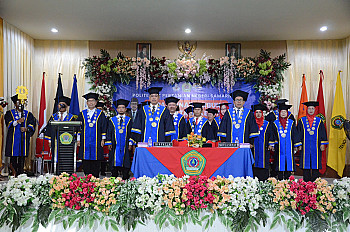
Samarinda State Agricultural Polytechnic Holds Open Senate Meeting to Commemorate 37th Anniversary
Samarinda, January 9, 2026 – The Samarinda State Agricultural Polytechnic (Politani Samarinda) held an Open Senate Meeting to commemorate its 37th anniversary on Monday (January 9, 2026). This solemn and spirited event not only reflected on the institution's long journey but also set the stage for a major transformation. The event, attended by members of the Politani Samarinda academic community, was also enlivened by the presence of distinguished guests from various polytechnics, including Samarinda State Polytechnic (Polnes), Nunukan State Polytechnic (PNN), Pangkajene Islands State Polytechnic (Polipangkep), and Madura State Polytechnic (Poltera). The Director and several staff members of each campus were in attendance. The event began with a scientific oration delivered by Dr. Myrna Asnawati Safitri, S.H., M.S.I., Deputy for Environment and Natural Resources of the Indonesian Capital City (IKN). In her presentation, Dr. Myrna emphasized the urgency of sustainable environmental and natural resource management. She also underscored the strategic role of the new capital city, which will be integrated with the development of the modern plantation and agricultural sectors, as well as the significant opportunities for agricultural vocational education to contribute to the development of the new capital. Regional officials also joined in the celebration of Politani Samarinda's anniversary, before welcoming remarks from Ahyar Muhammad Diah, S.E., M.M., Ph.D., Chair of the Indonesian State Polytechnic Forum and Director of Politani Samarinda. In his remarks, he expressed his appreciation for Politani Samarinda's achievements and the importance of synergy between polytechnics in strengthening vocational education in Indonesia. Next, the signing ceremony for the MoU between Politani Samarinda, the Nunukan State Polytechnic, and the Pangkajene Islands State Polytechnic. This collaboration was strengthened with the presentation of souvenirs as a symbol of friendship and commitment to progress together. The closing remarks were delivered by Hamka S.TP., M.Sc., MP, Director of Politani Samarinda. He proudly announced the imminent transformation of Politani Samarinda into a university, named Universitas Politeknik Nusantara (UPN). This announcement was met with thunderous applause, marking the beginning of a new and challenging chapter. The event officially concluded with a group photo session with all invited guests and members of the Politani Samarinda Senate. Afterward, to view the programs and innovations produced by Politani Samarinda's study programs, the guests were invited to tour the exhibition booths showcasing the research results of students, PLPs, and lecturers from each study program at Politani Samarinda. With renewed enthusiasm and strengthened commitment, this 37th anniversary commemoration is not just a celebration, but a starting point towards the future of Universitas Politeknik Nusantara (UPN).
-thumb.jpg)
Fun Walk to Commemorate the 37th Anniversary of the Samarinda State Agricultural Polytechnic
SAMARINDA (06/02/2026) – The fun walk organized by Politani Samarinda was not dampened by the light rain. The Samarinda State Agricultural Polytechnic (POLITANI) successfully held a fun walk to commemorate its 37th anniversary on Friday morning (6/2/2026). The theme of this fun walk was "Healthy Steps, Strong Campus, Great Future," and it was enthusiastically attended by the entire academic community and the surrounding community. Despite the unfavorable weather, with rain pouring down since morning, this did not dampen the enthusiasm of hundreds of participants. The event was opened by the director of Politani Samarinda, Hamka, S.TP., M.Sc., MP, with the release of 37 balloons, symbolizing Politani Samarinda's 37th anniversary. A prayer followed before the fun walk began. The diverse attendance reflected the entire POLITANI Samarinda community. Lecturers, educational staff (PLP), administrative staff, students from various departments, and the surrounding community all participated in the event. The fun walk began and ended at the POLITANI Samarinda campus, passing through the surrounding area. It featured entertainment such as group exercise, as well as several food stalls and sponsor booths. The event was supported by several sponsors, including Bank BSI, PT. Mahakam IndoNusa, PT. Tirta Multi Teknik KSO, CV. Java Computer, and CV. HITECH MEDIA COMPUTINDO, who provided door prizes to enliven the Politani Samarinda Fun Walk. The numerous and varied door prizes drawn after the fun walk enlivened the atmosphere and added to the excitement. The event proceeded smoothly and orderly. The participants, drenched by the rain, appeared even more enthusiastic and happy, especially during the door prize distribution session. It is hoped that the momentum of the 37th Anniversary can be a new encouragement for POLITANI Samarinda to continue to develop, innovate, and contribute more to the development of the agricultural sector in East Kalimantan and Indonesia.
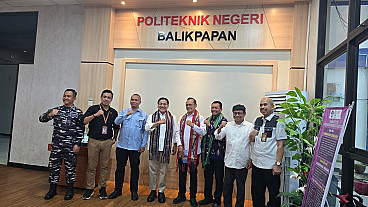
Samarinda Polytechnic Strengthens the Role of Vocational Education in the Science and Technology Transformation Workshop at Poltekba
Samarinda, January 29, 2026 - The Samarinda State Agricultural Polytechnic (Politani Samarinda) demonstrated its strong commitment to strengthening science and technology-based vocational education through the presence of Politani Samarinda Director Hamka, S.TP., M.Sc., M.P., and Deputy Director II Eva Nurmarini, S.Hut., M.P., as invited guests at a workshop entitled "Transforming the Vocational Science and Technology Ecosystem Towards a Center for Applied Technology Innovation in Support of the IKN Smart City and a National Technology Buffer." The event was organized by Balikpapan State Polytechnic (Poltekba) on Thursday (January 29, 2026) in the Theater Room on the 3rd Floor of the Poltekba Directorate Building. The presence of Politani Samarinda leaders at this strategic forum emphasized the active role of vocational higher education institutions in supporting the national development agenda, particularly the development of the Indonesian Capital City (IKN) as a smart city oriented toward innovation and applied technology. Politani Samarinda also took part in the discussion by conveying questions and strategic views regarding strengthening the vocational science and technology ecosystem, collaboration between universities, and the readiness of vocational human resources in East Kalimantan. This workshop served as a strategic forum to discuss the direction of science and technology-based vocational education development so that it can make a real contribution to the development of the new capital city while strengthening national technological independence. Several important issues were discussed, ranging from strengthening applied research, downstreaming innovation, to synergy between universities, industry, and the government. The event was attended by several national figures, including Special Advisor to the Minister of Higher Education, Science, and Technology, Admiral TNI (Ret.) Prof. Dr. Marsetio, S.I.P., M.M.; Director General of Science and Technology Prof. Ahmad Najib Burhani, M.A., M.Sc., Ph.D.; Secretary of the Directorate General of Science and Technology Dr. M. Samsuri, S.Pd., M.T., IPU.; and Director of Poltekba Dr. Emil Azmanajaya, S.T., M.T. The Director of Poltekba stated that this workshop was a crucial opportunity to strengthen the role of vocational education as a bridge between industry needs and the development of applied research. The Polytechnic is considered to have advantages in its practice-based learning approach and applicable innovation, especially in supporting the development of the IKN. In the same forum, the Directorate General of Science and Technology emphasized the importance of grounding science and technology to directly impact society, highlighting the mandate of higher education institutions to generate academic, economic, social, and environmental impact. Through active participation in this activity, Politani Samarinda affirmed its commitment to continuing its role in transforming the vocational science and technology ecosystem and strengthening the contribution of vocational higher education institutions to supporting the development of the Indonesian Capital City and the national technological buffer. (PR)
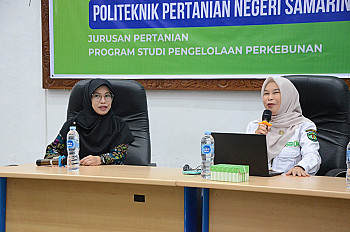
Santiaji Industrial Internship 1, Plantation Management Study Program, Samarinda State Agricultural Polytechnic
Tuesday, January 28, 2026 – The Santiaji Industrial Internship I program for the Plantation Management Study Program at Politani Samarinda was completed. This activity is part of the study program's obligation to provide training to students preparing for their internships at companies. The Plantation Management study program featured a speaker from the East Kalimantan Provincial Plantation Office, namely Ms. Ir. Asmirilda, MP, Head of the Sustainable Plantation Division. She presented material on realizing sustainable plantations as a pillar of a resilient and competitive future economy, providing students with a reference for their industrial internships at plantation companies. The second speaker was Mr. Bambang Suherman, Deputy Chairperson I of the East Kalimantan Branch of GAPKI and a staff member of Sinar Mas Plantation 3. In his presentation, he also shared his extensive experience working in a plantation company and the culture of living on a plantation. In addition to the training, students were also taught the procedures for completing and writing reports during and after the internship.
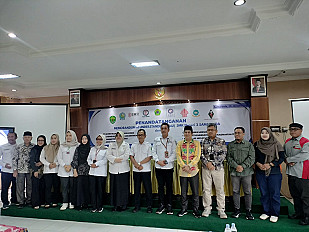
Politani Samarinda and a number of strategic partners signed an MoU with SMK Negeri 2 Samarinda.
SAMARINDA (28/01/2026) - The Samarinda State Agricultural Polytechnic (Politani Samarinda) signed a Memorandum of Understanding (MoU) with SMK Negeri 2 Samarinda on Tuesday, January 28, 2026. The signing was carried out by the Director of Politani Samarinda, Hamka, S.TP., M.Sc., M.P., as a form of commitment to strengthening synergy in vocational education. The MoU signing not only involved Politani Samarinda and SMK Negeri 2 Samarinda, but also several strategic partners from universities and the business world, namely Nahdlatul Ulama University of East Kalimantan, PT. Geometri Indonesia Samarinda, PT. Sagatrade Murni, PT. SSC Works Samarinda, and PT. Sulung Teknik Sejahtera. This collaboration aims to improve the quality of education and student competency by strengthening the link between education and the needs of the workforce. The scope of the collaboration covers education, training, human resource development, field work practices, competency enhancement, and other supporting programs relevant to the development of vocational education. This multi-stakeholder collaboration is expected to foster an integrated, adaptive, and sustainable vocational education ecosystem, enabling graduates to be prepared to face the challenges of the business and industrial world. The signing of this Memorandum of Understanding marks the first step in building a long-term, mutually beneficial partnership, while strengthening the role of vocational education institutions in producing superior, competitive human resources ready to contribute to regional and national development. (HUMAS)
-thumb.jpg)
Samarinda State Agricultural Polytechnic Holds Socialization of Training and Job Placement Program in Japan
The Samarinda State Agricultural Polytechnic (Politani) hosted a socialization and exploration of collaboration for a Japanese language training program and job placement in Japan on Wednesday (January 28, 2026). The event, which featured representatives from B2B Success Japan, aimed to open new opportunities for students and graduates. The keynote speaker, Noboru Osaka from B2B Success Japan, detailed the program's mechanics. The program focuses not only on intensive Japanese language acquisition but also includes job placements in various industrial sectors in Japan, including agriculture, technology, and services. The socialization also included discussions and further exploration of possible collaborations between Politani Samarinda and B2B Success Japan. It is hoped that this collaboration will pave the way for increasing graduates' competitiveness in the global job market, particularly in Japan. The event was enthusiastically attended by students from various majors and the respective Heads of Study Programs at Politani Samarinda, who actively asked questions about the procedures, requirements, and benefits of participating in the program.
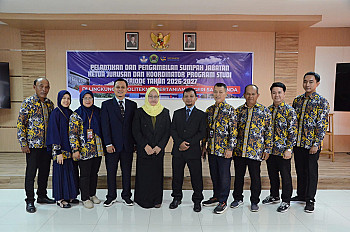
Inauguration of the Head of Department and Coordinator of the Samarinda State Agricultural Polytechnic Study Program for the 2026–2027 Period
SAMARINDA (27/01/2026) - The Samarinda State Agricultural Polytechnic (Politani Samarinda) held the inauguration and oath-taking ceremony for the Heads of Departments and Study Program Coordinators for the 2026–2027 academic year. The ceremony took place solemnly on January 27, 2026, in the 3rd-floor Meeting Room of the Politani Samarinda Directorate. The inauguration was officially led by the Director of the Samarinda State Agricultural Polytechnic, Hamka, S.TP., M.Sc., M.P., and attended by all leaders, lecturers, and educational staff at Politani Samarinda. This event is part of an effort to strengthen institutional governance and improve the quality of academic and vocational education services. On this occasion, the Director of Politani Samarinda inaugurated and sworn in several structural officials, namely: 1. Dr. Ahmad Zamroni, S.Hut., M.P. as Head of the Department of Agriculture 2. Dr. Edy Wibowo Kurniawan, S.TP., M.Sc., M.P. as Coordinator of the Food Engineering Technology Study Program 3. Dr. Elisa Herawati, S.Hut., M.P. as Coordinator of the Forest Management Study Program In his remarks, the Director of Politani Samarinda stated that this inauguration represents a significant mandate and responsibility that must be carried out with integrity, dedication, and commitment to advancing the institution. He expressed his hope that the inaugurated officials will play an active role in improving the quality of education, applied research, and community service, in line with the vision and mission of the Samarinda State Agricultural Polytechnic. The inauguration ceremony proceeded smoothly and orderly, marked by the recitation of the oath of office and the signing of the minutes. This moment represents a strategic step in supporting the continuity of academic leadership and strengthening the role of departments and study programs in facing the future challenges of vocational higher education. With the inauguration of structural officials for the 2026–2027 period, Politani Samarinda is expected to become even more solid in realizing a superior, competitive vocational education institution with a tangible impact on agricultural and forestry development, particularly in East Kalimantan. (HUMAS)
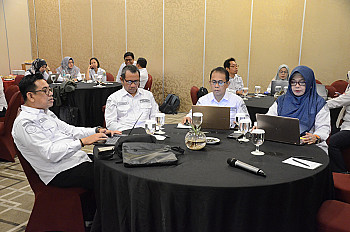
Workshop on the preparation of the 2026-2029 Strategic Plan (RENSTRA) and the 2025 Performance Report (LAKIN), Samarinda State Agricultural Polytechnic, January 21-22, 2026
January 2026 – To develop high-quality and accountable strategic planning documents, the Samarinda State Agricultural Polytechnic held a two-day workshop on the preparation of the 2025-2029 Strategic Plan (Renstra) and the 2025 Performance Report (LAKIN). The workshop took place on January 21-22, 2026. This strategic workshop featured competent ministerial-level speakers, including Mr. Muhammad Antoni Fauzy, an official from the Planning and Cooperation Bureau, Secretariat General of the Ministry of Education, Technology, and Science (Kemdiktisaintek). In his presentation, Antoni Fauzy emphasized the importance of the Renstra as a compass and roadmap for institutional development over the next five years. "The 2025-2029 Strategic Plan must be formulated with reference to the National Medium-Term Development Plan (RPJMN) and the Ministry of Education and Science and Technology's Strategic Plan, and with a careful analysis of both internal and external challenges and opportunities. Meanwhile, discussions regarding the 2025 LAKIN (Regional Performance Assessment) focused on sound, accurate, and evidence-based performance reporting techniques. This is crucial for public accountability and serves as evaluation material for improvements and the development of performance targets for the following year. The workshop was attended by the core leadership of Politani Samarinda, including Hamka, S.TP., M.Sc., MP, Director of Politani Samarinda; Heriad Daud Salusu, S.Hut., MP, Deputy Director I for Academic Affairs; Eva Nurmarini, S.Hut., MP, Deputy Director II for Finance; Husmul Beze, S.Hut., M.Si, Deputy Director III for Student Affairs; staff from the Planning, Finance, General Affairs, and Procurement Divisions; and several other staff members. Through this workshop, Politani Samarinda is expected to produce a comprehensive draft of the 2025-2029 Strategic Plan and the 2025 LAKIN, in accordance with ministry standards, ready to serve as a strong foundation for achieving excellence in agricultural vocational education in East Kalimantan and Indonesia as a whole.
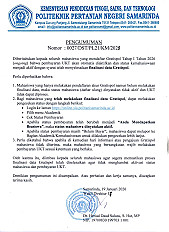
Announcement of the 2026 Phase I (ongoing) GRATISPOL Scholarship
https://online.sia.politanisamarinda.ac.id

Samarinda Politani Visits the IKN, Invites the IKN Authority to Collaborate for Impact
Samarinda, January 12, 2026 — The Director of the Samarinda State Agricultural Polytechnic (Politani Samarinda), Hamka, along with his Deputy Directors, namely Deputy Director I Heriad Daud Salusu, Deputy Director II Eva Nurmarini, and Deputy Director III Husmul Beze, visited the Indonesian Capital City Authority (IKN) office on Monday (January 12, 2026). The visit aimed to explore strategic collaborations that would have a tangible impact on the development of the IKN. During the meeting, Hamka outlined various research achievements of lecturers and the forms of collaboration that Politani Samarinda has undertaken with several partners in recent years. He emphasized that Politani Samarinda lecturers possess a diverse range of relevant expertise that can be utilized to support the IKN Authority's programs. Furthermore, Hamka explained that Politani Samarinda possesses competencies in various fields, including waste management, post-mining land rehabilitation, geotagging of endemic Kalimantan trees, organic rice and paddy development, nursery management, and other strategic areas. Samarinda Polytechnic currently has 14 study programs, each of which has its own unique characteristics and scientific excellence. Myrna Asnawati Safitri, Deputy for Environment and Natural Resources at the National Capital Authority (IKN), welcomed the impactful collaboration initiative presented by the Samarinda Politani delegation. She stated that the collaboration idea aligns closely with the mission and programs currently implemented by the IKN Authority. Accompanied by the Director of Environment and Disaster Management, Lazuardi Nasution, the Director of Forestry and Water Resources Utilization Development, Onesimus Patiung, and the Director of Food Security, P. Setia Lenggono, and their team, Myrna emphasized that her office highly appreciates collaboration that is accompanied by concrete actions on the ground, not merely conceptual meetings and discussions without implementation. Myrna also stated that the New Capital City (IKN) is opening up opportunities for collaboration with universities as widely as possible. However, she emphasized the importance of focusing on one or two priority programs to ensure that the collaboration truly impacts and is directly felt by the community. One pressing issue highlighted is the issue of community waste in the Samboja area. Furthermore, the New Capital City Authority is providing the Samarinda Polytechnic (Politani Samarinda) with the opportunity to participate in the development of the Bukit Tengkorak area in Suko Mulyo, North Penajam Paser Regency. This area is considered to have the potential to become a showcase for the Samarinda Polytechnic to showcase its contributions and role at the national and international levels, considering that the New Capital City is Indonesia's primary face on the island of Kalimantan. (PR)
-thumb.jpg)
Politani Samarinda's Strategic Steps in the National Agenda for Impactful Higher Education
JAKARTA (06/01/2026) - The Director of the Samarinda State Agricultural Polytechnic (Politani Samarinda), Hamka, S.TP., M.Sc., M.P., attended the 2026 Impactful Higher Education Performance Contract Signing Ceremony held by the Ministry of Higher Education, Science, and Technology of the Republic of Indonesia (Kemdiktisaintek) on Monday (5/1/2026). This national event took place at the Graha Diktisaintek Hall, 2nd Floor, Building D, Kemdiktisaintek, Jalan Jenderal Sudirman Pintu Satu, Senayan, Central Jakarta. The performance contract signing was attended by selected state universities (PTN) and private universities (PTS) from across Indonesia as part of efforts to strengthen higher education governance based on performance, impact, and accountability. Politani Samarinda is one of the vocational universities entrusted to participate in this strategic agenda. This participation reflects Politani Samarinda's active role in supporting national higher education policies, particularly in encouraging the implementation of vocational education relevant to the needs of development, society, and the business and industrial worlds. The signing of the Impactful Higher Education Performance Contract is an implementation of the Impactful Higher Education policy, which emphasizes the role of higher education institutions not only on academic achievement but also on tangible and measurable contributions to national development and improving public welfare. Through participation in this activity, Politani Samarinda affirms its commitment as an adaptive and responsive vocational state university (PTN) in implementing the Tri Dharma of Higher Education in a sustainable manner. It is also ready to actively contribute to the transformation of national higher education, in line with the spirit of Impactful Higher Education and Technology (Diktisaintek) towards a Golden Indonesia 2045. (HUMAS)
